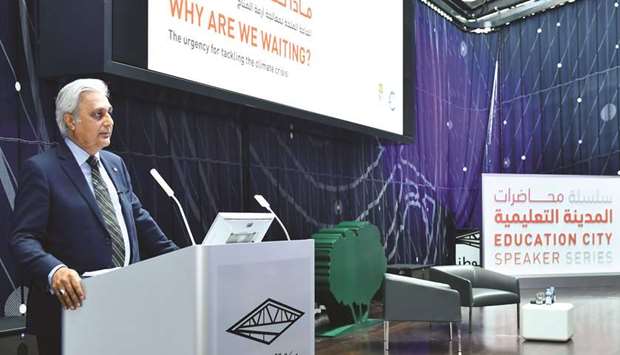When it comes to climate change, people have the knowledge, know what needs to be done, have the tools and agreements ratified, but what the world needs to ensure is implementation of the agreements.
This was the crux of the lecture delivered by Ovais Sarmad, Deputy Executive Secretary United Nations Framework Convention on Climate Change (UNFCCC), at the auditorium of Qatar National Library (QNL) recently.
He was addressing Earth Talks, a series of lecturers organised by Qatar chapter of Arab Youth Climate Movement (AYCM) that is a non-profit group of young people striving to raise awareness about climate change and its impacts among young people. The lecture was named as ‘Why Are We Waiting? – The Urgency for Tackling the Climate Crisis.’
Sarmad, who earlier served as chief of staff to the director general of the International Organization for Migration (IOM), carries nearly 27 years of experience with IOM, where he worked in several policy and management areas to strengthen the organisation’s operational effectiveness in close consultation with IOM member-states. He was instrumental in the establishment of the organisation’s Ethics and Conduct Office and was a key team member negotiating the agreement which brought the IOM into the United Nations System.
Following an early career in financial management, both in public and private sectors in the United Kingdom, Sarmad, who hails from India, joined IOM in 1990, in Geneva.
Sharing his perspective with a large audience, majority consisting of young people, Sarmad highlighted the topics such as climate emergency, need to reduce the emissions, the international response, role of the youth, economic growths, and what we can all collectively do?
In terms of climate emergency, the UN official said: “Every negative word has been attached to the climate because of the urgency. Scientific evidence is at our disposal that tells us that we are in great trouble. Simply and really we are in great trouble because the IPCC [Intergovernmental Panel on Climate Change] report, published last year, very clearly plays out that at the current rate of global carbon emissions, we will not be in line with the target of the Paris Agreement to limit the temperature rise to 1.5 degree up to the mid of the century.
“We can see the impact of the global warming every where in terms of both economic and emotional impacts on human beings – especially in low-lying countries. We also refer to climate change as threat multiplier. The time between 2015 and 2019 has been the hottest five years on the record. The carbon emission in this period has also been the highest in human life, the highest since our species began. If this is not an emergency then what is it? So, we must re-double our efforts at all levels of the society. Falling short would lock in climate change impacts so catastrophic that we will not be able to recognise the world that we used to.”
Regarding reducing the global emission of carbon, Sarmad said: “We must reduce global temperature and gas emissions 0.5 percent below the 2010 level. There is excellent monitoring mechanism for the target. We need to achieve carbon neutrality by 2050. To do that, it is a huge challenge. It would require all our ingenuity, expertise, and determination that humanity can collectively muster. It requires deep transformation in the policy, in the measures, in the way we can produce and reduce the energy. We have significant work to do.”
The UN official expressed his hopefulness as far as efforts at the global and political levels are concerned. “Governments are very much engaged at different levels. They have agreed to the rule book last year. This year they are coming together to set the stage to reduce the emissions. Efforts are now on climate action. 2020 is important. Next year the National Determined Contributions (NDCs) will be submitted.”
The role of the youth and opportunities of engagement are very important in addressing the challenge. “We all need to come together, especially, the youth. We, the older generation, did not inherit the situation. We actually borrowed from the future generations. We have huge moral and ethical responsibility to ensure that we give back the environment safe, resilient and sound manner to the younger generation. The world’s youth is an essential voice at the table. They are heard at the UN. Take the example of AYCM, started in Doha.”
Towards the end of the lecture, the audience asked multiple questions from the UN official regarding climate change and what they can do as individuals.
In the beginning, Neeshad Shafi, AYCM executive director, delivered the welcome address and introduced the speaker and the topic to the audience.
Community / Culture
‘World’s youth is an essential voice on climate change’ Ovais Sarmad, Deputy Executive Secretary UNFCCC, speaks about urgency to address climate change at QNL auditorium

..
